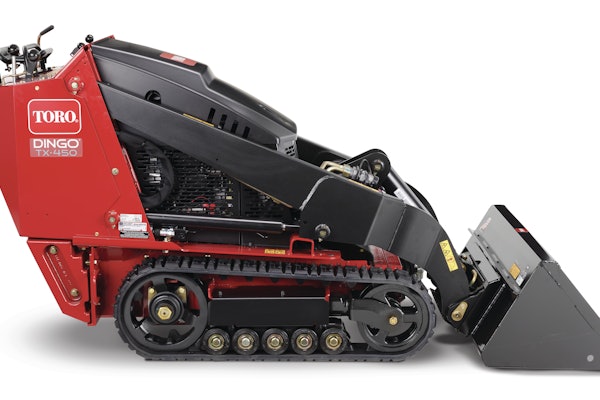 Photo: Moccia Lawn and Landscape, Inc.
Photo: Moccia Lawn and Landscape, Inc.Since landscapers were deemed essential in Michigan, companies have been hitting the ground running to make up for lost time.
For Austin Moccia, owner and CEO of Moccia Lawn and Landscape, Inc. in Grosse Ile, Michigan, the phones have not stopped ringing since the ruling went out that landscapers could, once again, resume lawn and landscaping services.
On May 1, Moccia says they officially started back up operations, and he said the transition went smoothly, as all of his employees were chomping at the bit to get back to work.
Unlike many landscaping companies in the area, Moccia says they work seven days a week, which has definitely helped them in the hustle to get back on schedule.
“We have enough staff here to support seven days a week constant operation, which is a pretty big pillar of the success we’ve had,” says Moccia. “I think people appreciate projects moving a little bit quicker. We’ve been lucky that people have been adaptive and understanding. We’ve had a really great experience there, but I credit that mostly to people being appreciative of being informed. They know some things are beyond our control but as long as they’re apprised of that, we haven’t had anyone upset.”
Once news got out that work could resume, Moccia says the first step he took was to contact customers to keep everyone on the same page, which he says they were very appreciative of.
Another major change they’ve implemented is a fleet detailing and sanitization program for all trucks to ensure they are correctly cleaned after use. Moccia says by taking these measures, it shows customers and the general public that they are taking COVID-19 seriously.
“We’re making sure that we’re maintaining a level of cleanliness that sets a good example and shows we’re taking this seriously, and that reassures our customers,” says Moccia. “And obviously, that also has the intended effect of keeping everybody healthy. It was a bit of an adjustment because it is an industry where you’re used to being in the dirt and dust, so the constant washing and things like that were a bit of an adjustment. But we had our first full week go through and things have worked out well.”
Moccia says to enforce social distancing, they are only allowing one person per truck, which he does admit isn’t as efficient as he would like, but he says if it helps them follow the rules and potentially keep more people healthy, it’s something that needs to be done.
 Photo: Moccia Lawn and Landscape, Inc.
Photo: Moccia Lawn and Landscape, Inc.Moccia says they’ve also had to become more strategic about finding restrooms and have asked employees to bring their lunch with them each day, as many restaurants and public restrooms are either not opened or aren’t allowing customers inside.
Getting back in the game
Over the past month, Moccia says he and his team did not sit idly by waiting for their chance to get back to work. Instead, they made the most of their temporary closure and completed necessary fleet maintenance to ensure they were ready to get back to work as quickly as possible when the time came.
“My mechanical staff and I put in a lot of hours to try and make sure our trucks were ready and our equipment was good to go,” says Moccia. “No matter what, you know you can never anticipate every breakdown, but you try and make sure the equipment’s ready to go. We also brought all of our staff on board with what the new fleet detailing program and the cleanliness and disinfectant programs are.”
Moccia says they were fortunate enough to not have any layoffs during the closure, and he is proud to say that all of his employees gladly returned to work.
Moccia says he’s heard from others in the business that many of their employees chose not to come back to work, as they were able to make more money by filing for unemployment. Moccia says he’s thankful that that was not the case for his crews, and to reward that loyalty, they’ve already given raises this year.
“I think that was a great decision,” says Moccia. “I know a lot of people might think that’s not the smartest idea right now, but we have 100 percent retention year over year. So, I think the results ultimately speak for themselves that when you take good care of people, they stay with you. It’s not cheap, but it’s one of those things where you get what you pay for.”
Even though some projects have fallen behind on production, Moccia says it has actually proven beneficial in some ways, as customers have had more time to think of additional projects they’d like to tack onto their existing plan.
Moccia says he was initially shocked at how closely his customers followed the situation with the company’s ability to work, and upon hearing the news that landscapers were deemed essential, he says he received between 30 and 40 calls, as well as numerous emails about continuing services.
 Photo: Moccia Lawn and Landscape, Inc.
Photo: Moccia Lawn and Landscape, Inc.Currently, Moccia says the biggest challenge of getting back to work has been making sure that no inquiry goes unanswered. Each day, Moccia says he and other members of the team will check and recheck voicemails and emails to make sure that no one was accidentally left out in the cold.
“It’s hasn’t been draining but it’s just been more effort because you have a volume that’s normally spread out over March and into April that all of a sudden was just slammed in at the end of April and into May,” says Moccia. “It was really incredible, and for about six or seven days, we had anywhere from 100 to 200 calls, emails and voicemails.”
Making adjustments
Moccia says that even with things slowly transitioning back to a form of normalcy, there are still a few things he and his team are getting used to.
With some businesses still closed, Moccia says receiving supplies has taken a little longer than usual, which is something the company must keep in mind when looking ahead at project lists.
“With a lot of those suppliers’ ETA times, you may be able to get a custom plan order in a week, and it might take two weeks for the supplies to come in,” says Moccia. “Now, little things like that have required more micromanagement.”
He also says it was a bit of a learning curve to figure out the best ways of meeting and communicating with clients, whether virtually or at a safe distance apart, but once those actions were established, he says his teams were ready to roll.
“At the end of the day, that’s why we’re here; that’s what all this is for,” says Moccia. “I always tell my team that you’ve got to see the forest through the trees. All the working on the trucks, all the disinfection, all the project organization, it’s all to make sure that when we’re finally at someone’s house, the execution of their landscape is perfect and immaculate.”
Through it all, Moccia says these changes, while mildly difficult to get used to at first, were well worth it in the end because it ensured that his teams were once again able to serve their community.
 Photo: Moccia Lawn and Landscape, Inc.
Photo: Moccia Lawn and Landscape, Inc.“Despite the challenges, I told my guys these are the things we’re going to need to overcome,” says Moccia. “We didn’t pick this fight, but it doesn’t matter. You have two options: we can excel and use this as an opportunity to implement some new things that make us stronger, more adaptive and resilient, or everybody can whine and get nothing done.”










